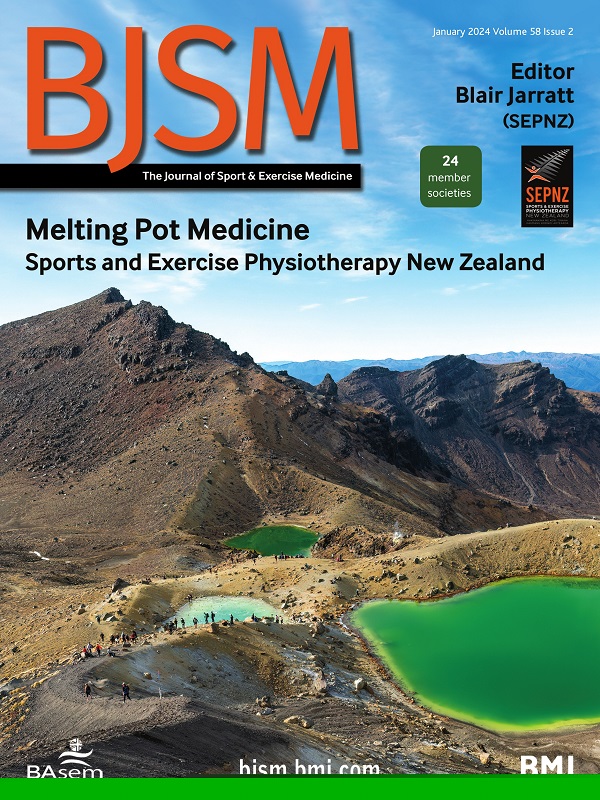Elevating the games: the future of the Olympics and Paralympics at higher altitudes
IF 11.6
1区 医学
Q1 SPORT SCIENCES
引用次数: 0
Abstract
Climate change and global warming may prompt the relocation of future Summer and Winter Olympic/Paralympic Games to higher elevations, driven by the pursuit of sustainability and emerging health concerns for athletes.1 This shift could be motivated by the quest for safer environmental conditions, aiming to reduce thermal stress in Summer Olympics/Paralympics or ensure adequate snow conditions in Winter Games. While the Summer Olympic and Paralympic Games have traditionally been held during the hot summer season in the northern hemisphere, relocating the competition to a different time of year could lead to safer environmental conditions, even at sea level. Organising the 2022 FIFA World Cup in winter in Qatar, instead of during the hottest months, serves as a notable example. However, rescheduling the Summer Games may lead to scheduling conflicts with other major sporting events, reducing global participation and viewership, while also disrupting athletes’ training cycles and potentially impacting their performance. With the exception of Mexico City in 1968, situated at an altitude of 2300 metres above sea level, no other Summer Olympic/Paralympic Games have been held at altitudes exceeding 530 metres (Munich in 1972).2 A thorough investigation is needed to understand the impact of moderate terrestrial altitude on various sports and the required athletic preparations for optimal performance at higher elevations. Essentially, the argument centres on altitude providing a cooler and more moderate climate, addressing challenges posed by extreme heat in …提升奥运会:高海拔地区奥运会和残奥会的未来
气候变化和全球变暖可能会促使未来的夏季奥运会和冬季奥运会/残奥会迁往海拔更高的地方,这是出于对可持续发展的追求和对运动员新出现的健康问题的关注1。这种转变可能是出于对更安全环境条件的追求,目的是减少夏季奥运会/残奥会的热应力,或确保冬季奥运会有足够的积雪条件。虽然夏季奥运会和残奥会历来在北半球炎热的夏季举行,但将比赛移至一年中的另一个时节举行,即使是在海平面上,也能带来更安全的环境条件。2022 年国际足联世界杯在卡塔尔冬季举行,而不是在最炎热的月份举行,就是一个显著的例子。然而,重新安排夏季奥运会的时间可能会导致与其他大型体育赛事的时间冲突,减少全球的参与度和收视率,同时还会打乱运动员的训练周期,并可能影响他们的表现。除了 1968 年在海拔 2300 米的墨西哥城举办过夏季奥运会/残奥会之外,没有其他夏季奥运会/残奥会是在海拔超过 530 米的地方举办的(1972 年在慕尼黑举办)。从根本上说,这一论点的核心是海拔高度提供了更凉爽、更温和的气候,可应对极端高温带来的挑战......
本文章由计算机程序翻译,如有差异,请以英文原文为准。
求助全文
约1分钟内获得全文
求助全文
来源期刊
CiteScore
27.10
自引率
4.90%
发文量
217
审稿时长
3-8 weeks
期刊介绍:
The British Journal of Sports Medicine (BJSM) is a dynamic platform that presents groundbreaking research, thought-provoking reviews, and meaningful discussions on sport and exercise medicine. Our focus encompasses various clinically-relevant aspects such as physiotherapy, physical therapy, and rehabilitation. With an aim to foster innovation, education, and knowledge translation, we strive to bridge the gap between research and practical implementation in the field. Our multi-media approach, including web, print, video, and audio resources, along with our active presence on social media, connects a global community of healthcare professionals dedicated to treating active individuals.

 求助内容:
求助内容: 应助结果提醒方式:
应助结果提醒方式:


